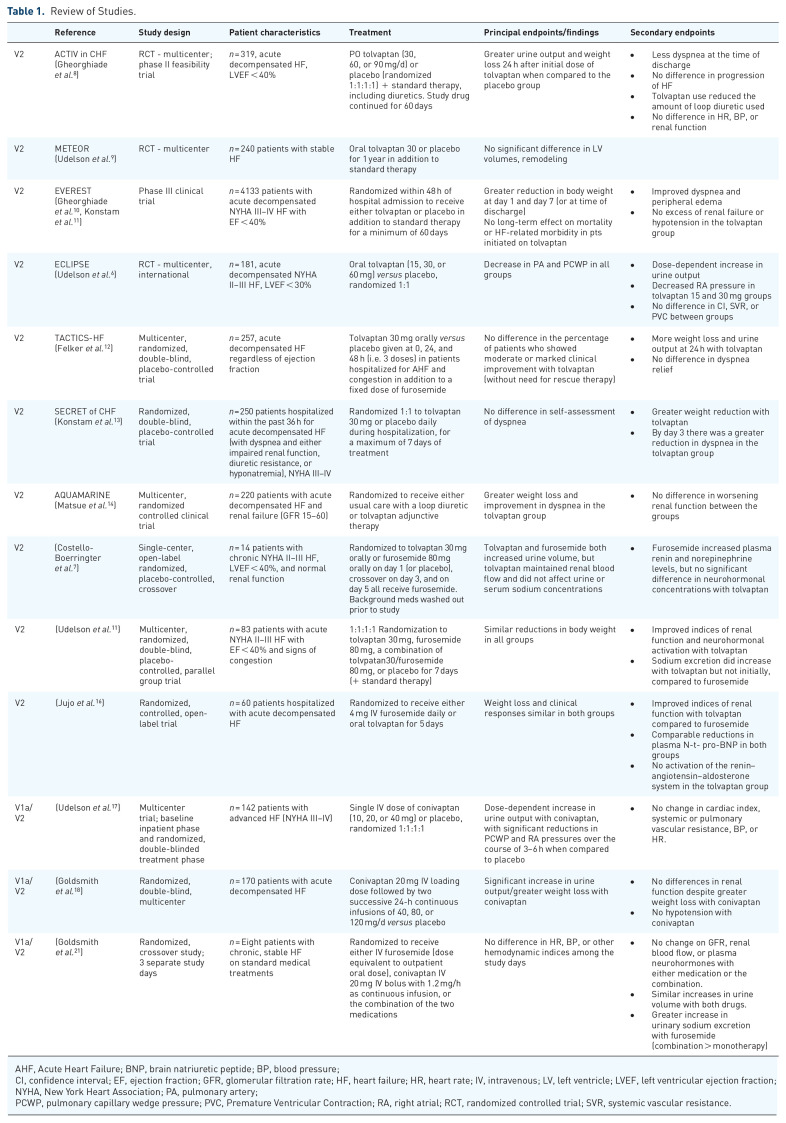抗利尿激素在心力衰竭中的拮抗作用:血流动力学研究和主要临床试验的综述。
IF 2.2
Q2 CARDIAC & CARDIOVASCULAR SYSTEMS
引用次数: 14
摘要
几十年来,血浆精氨酸加压素(AVP)水平在充血性心力衰竭(HF)患者中升高。AVP信号在V1a和V2受体中的任何一个或两个都过量,可能通过多种机制促进HF的病理生理。V1a的激活可引起血管收缩和/或直接心肌肥大,因为细胞内信号通路与血管紧张素II的信号通路密切相关。V2激活会导致液体潴留和低钠血症。一项使用纯V2拮抗剂托伐普坦(TV)的血流动力学研究显示其血流动力学影响很小。与另一项研究中的速尿相比,TV对肾脏和神经激素的影响是有利的。一些临床试验表明,TV作为急性心衰的辅助治疗对体液平衡和呼吸困难有有益的作用,没有肾功能恶化或神经激素刺激。两项较小的研究,一项针对急性心衰,另一项针对慢性心衰,显示了与利尿剂相比,TV的临床效果和更有利的肾脏和神经激素作用。然而,长期电视治疗并没有改变急性心衰的结果。除了静脉注射纯V1a拮抗剂的单剂量研究外,没有其他数据,该研究显示,如果血浆AVP水平升高,则有血管舒张作用。一项血液动力学研究和一项短期临床试验显示,静脉注射平衡V1a/V2拮抗剂康尼伐坦(CV)的血液动力学和临床效果与类似研究中使用TV的血液动力学和临床效果基本相似。一种新的口服有效的平衡V1/V2拮抗剂(pecavaptan)作为急性心衰住院期间和住院后的辅助和替代治疗,目前正在进行II期研究。本综述的目的是总结我们从TV和CV的临床经验中学到的东西,并提出这些发现对未来使用新药物的意义。本文章由计算机程序翻译,如有差异,请以英文原文为准。

Vasopressin antagonism in heart failure: a review of the hemodynamic studies and major clinical trials.
For decades, plasma arginine vasopressin (AVP) levels have been known to be elevated in patients with congestive heart failure (HF). Excessive AVP signaling at either or both the V1a and V2 receptors could contribute to the pathophysiology of HF by several mechanisms. V1a activation could cause vasoconstriction and/or direct myocardial hypertrophy as intracellular signaling pathways are closely related to those for angiotensin II. V2 activation could cause fluid retention and hyponatremia. A hemodynamic study with the pure V2 antagonist tolvaptan (TV) showed minimal hemodynamic effects. Compared with furosemide in another study, the renal and neurohormonal effects of TV were favorable. Several clinical trials with TV as adjunctive therapy in acute HF have shown beneficial effects on fluid balance and dyspnea, with no worsening of renal function or neurohormonal stimulation. Two smaller studies, one in acute and one in chronic HF, have shown comparable clinical and more favorable renal and neurohormonal effects of TV compared with loop diuretics. However, long-term treatment with TV did not alter outcomes in acute HF. No data are available other than single-dose studies of an intravenous pure V1a antagonist, which showed a vasodilating effect if plasma AVP levels were elevated. One hemodynamic study and one short-duration clinical trial with the balanced intravenous V1a/V2 antagonist conivaptan (CV) showed hemodynamic and clinical effects largely similar to those with TV in similar studies. A new orally effective balanced V1/V2 antagonist (pecavaptan) is currently undergoing phase II study as both adjunctive and alternative therapy during and after hospitalization for acute HF. The purpose of this review is to summarize what we have learned from the clinical experience with TV and CV, and to suggest implications of these findings for future work with newer agents.
求助全文
通过发布文献求助,成功后即可免费获取论文全文。
去求助
来源期刊

Therapeutic Advances in Cardiovascular Disease
CARDIAC & CARDIOVASCULAR SYSTEMS-
CiteScore
3.50
自引率
0.00%
发文量
11
审稿时长
9 weeks
期刊介绍:
The journal is aimed at clinicians and researchers from the cardiovascular disease field and will be a forum for all views and reviews relating to this discipline.Topics covered will include: ·arteriosclerosis ·cardiomyopathies ·coronary artery disease ·diabetes ·heart failure ·hypertension ·metabolic syndrome ·obesity ·peripheral arterial disease ·stroke ·arrhythmias ·genetics
 求助内容:
求助内容: 应助结果提醒方式:
应助结果提醒方式:


